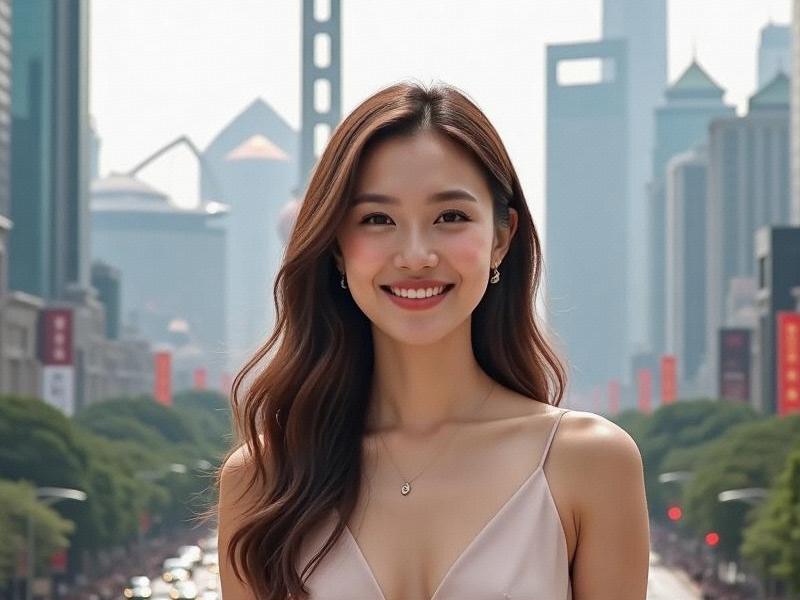
The Shanghai Phenomenon: Where East Meets West in Modern Femininity
In the glittering landscape of Shanghai's skyline, where the Oriental Pearl Tower winks at colonial-era buildings along the Bund, a new breed of Chinese woman has emerged - the quintessential Shanghainese female, embodying what scholars now call "the Shanghai paradox": traditional grace fused with metropolitan edge.
The Beauty Standard: More Than Skin Deep
Shanghai's beauty ideals present a fascinating case study in cultural adaptation. Unlike the dramatic transformations sought in Seoul or the minimalist approaches of Tokyo, Shanghai women pursue what dermatologists term "strategic enhancement." At the prestigious Shanghai Ninth People's Hospital, cosmetic specialists report that local women overwhelmingly request procedures that "look natural" - subtle eyelid adjustments rather than dramatic Westernization, soft filler enhancements instead of sharp contouring.
"Shanghai women want to look like the best version of themselves, not like someone else," explains Dr. Zhang Mei, director of cosmetic surgery at Ruijin Hospital. "There's tremendous pride in maintaining distinctly Chinese features while meeting global standards of attractiveness."
This philosophy manifests in Shanghai's booming beauty industry, where traditional Chinese medicine clinics offering gua sha facials exist alongside French cosmeceutical boutiques. On Maoming Road, women might visit a TCM practitioner in the morning for an herbal facial, then head to a Korean-style medi-spa in the afternoon for non-invasive lifting treatments.
上海龙凤419杨浦 Fashion as Cultural Statement
Shanghai's sartorial scene reveals its mercantile DNA. The city's women have perfected what fashion historians call "calculated eclecticism":
• High-Low Mixing: Pairing luxury handbags with emerging local designer pieces
• Temporal Blending: Incorporating qipao elements into contemporary workwear
• Cultural Synthesis: Combining Chinese silk with Italian leather craftsmanship
"Getting dressed in Shanghai is serious business," observes fashion blogger Lin Yue (ShanghaiStyleDiaries). "Your outfit needs to telegraph that you're worldly but rooted, ambitious but not aggressive, fashionable but not trying too hard."
The phenomenon has given rise to what's known as "the boardroom cheongsam" - modernized versions of the traditional dress worn by female executives in Lujiazui's financial district. These dresses, often in neutral tones with subtle Mandarin collars, allow women to "command Western-style respect without sacrificing Chinese identity," as described by HSBC vice president Wang Xiu.
上海贵族宝贝sh1314 Education as Beauty Capital
Shanghai women lead China in educational attainment, with 68% holding university degrees (compared to 52% nationally). This creates what sociologists term "the diploma effect" - where intellectual achievements enhance perceived attractiveness. In Shanghai's famous marriage markets, profiles prominently display degrees from Fudan or Tongji University alongside physical attributes.
"Education is the new designer handbag," remarks sociologist Dr. Emma Chen of NYU Shanghai. "A master's degree from a prestigious university does more for a woman's social capital than perfect cheekbones."
The Digital Beauty Revolution
Shanghai's beauty influencers have redefined Chinese standards of attractiveness:
• ModernShanghaiGirl demonstrates "power makeup" for female entrepreneurs
上海花千坊龙凤 • EastMeetsWestBeauty bridges Asian and Western beauty techniques
• ShanghaiAcademic promotes "smart girl chic" for graduate students
Collectively boasting over 40 million followers, these digital creators have made Shanghai the epicenter of China's beauty discourse.
The Pressure Beneath the Surface
The pursuit of "triple perfection" (career success, family harmony, and flawless appearance) drives many Shanghai women to extreme measures. Psychologists report rising cases of "haipai anxiety" - stress related to maintaining Shanghai's exacting standards. Plastic surgeons note increasing requests from women over 35 seeking "refreshing" procedures to combat workplace ageism.
Yet as Shanghai cements its status as Asia's leading global city, its women continue evolving a distinctive urban femininity that redefines what it means to be beautiful, ambitious and Chinese in the 21st century - one strategic skincare routine and boardroom victory at a time.
